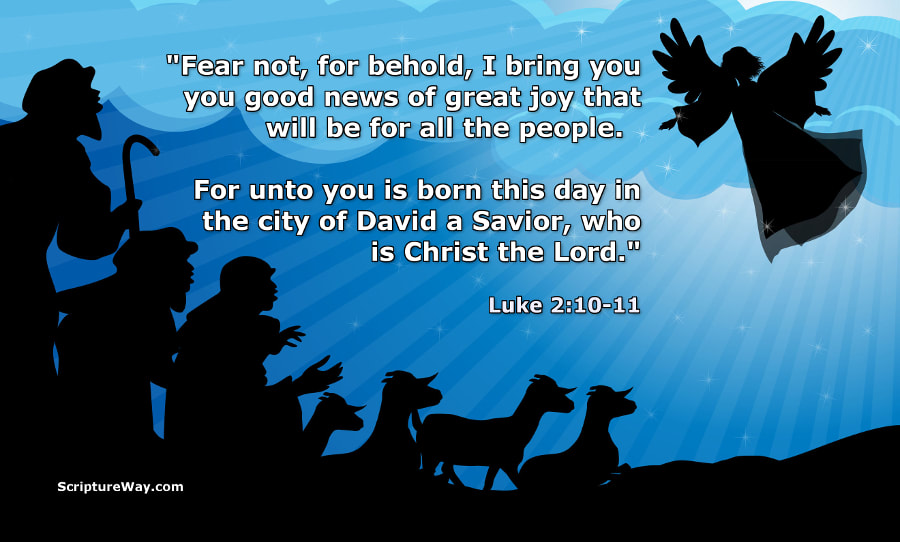Image source: Sweet Publishing / FreeBibleimages.org.
"Now the angel of the Lord came and sat under the terebinth at Ophrah, which belonged to Joash the Abiezrite, while his son Gideon was beating out wheat in the winepress to hide it from the Midianites. And the angel of the Lord appeared to him and said to him, 'The Lord is with you, O mighty man of valor.'" (Judges 6:11-12)
"He [the beloved Son of God - Col. 1:13] is the image of the invisible God, the firstborn of all creation." (Colossians 1:15, brackets added)
This lesson teaches that the angel of the Lord who appeared in the Old Testament to Hagar, Moses, Gideon, and others is the preincarnate Lord Jesus Christ. The angel of the Lord in the Old Testament bears the unmistakable marks of deity and speaks as "the Lord" and as "God" (Ref. 1 below). This lesson describes 1) Who is the angel of the Lord?, 2) What is the main characteristic of the angel of the Lord that indicates deity?, and 3) Where in scripture has the angel of the Lord appeared?
Consider. Do you believe that the Lord Jesus Christ, the Son of God, appeared visibly in the Old Testament?
The scripture quotations in this lesson are taken from the English Standard Version (ESV) unless noted otherwise (Ref. 2).
1. Who Is the angel of the Lord in the Old Testament?The Preincarnate Christ -- Jesus in the Old Testament
The angel of the Lord who appeared to men and women in the Old Testament was the preincarnate Lord Jesus Christ. These temporary appearances of Christ in the Old Testament are called "preincarnate" because they occurred before Jesus was conceived by the Holy Spirit in Mary (Luke 1:30-35) and before "the Word became flesh and dwelt among us" (John 1:14).
Do not be surprised that Jesus Christ, the beloved Son of God (Colossians 1:13), has appeared in the Old Testament. He is the creator of all things, and therefore predates the creation of all things (Colossians 1:16-17, John 1:1-3). Micah the prophet wrote, "But as for you, Bethlehem Ephrathah, Too little to be among the clans of Judah, From you One will go forth for Me to be ruler in Israel. His goings forth [appearances] are from long ago, From the days of eternity" (Micah 5:2 NASB 1995, brackets added from a NASB 1995 footnote). Keep also in mind that Jesus is the visible expression of God (Colossians 1:15, Hebrews 1:3). Whenever a person in the Old Testament visibly saw God (for example, Gideon recognized the angel of the Lord as the Lord God in Judges 6:19-23), it was Son sent forth by the Father -- the second person of the Trinity of the Father, Son, and Holy Spirit (Matthew 3:16-17, Matthew 28:19, Ref. 3 below). 2. What is the main characteristic of the angel of the Lord that indicates deity?
As you read through the scripture references below in Section 3, consider the main "clue" that indicates the angel of the Lord is deity:
3. Where in scripture has the angel of the Lord appeared?
The angel of the Lord speaking as the Lord himself appears throughout the Old Testament beginning with Genesis 16:1-13 (appearance to Hagar) through Zechariah 3:1-10 (appearance to Joshua the high priest). For your reference and further study, the page, "Bible Verses About the Angel of the Lord in the Old Testament" provides more than 15 scripture reference about the angel of the Lord.
Subsections a, b, and c below discuss three appearances of the angel of the Lord -- to Hagar, Moses, and Gideon. a. Example 1 -- The angel of the Lord appears to Hagar
Read Genesis 16:1-14. Genesis 16:7 is the first mention of the angel of the Lord in the Old Testament. Hagar was in distress because of harsh treatment from Sarai, Abram's wife, and Hagar had fled from Sarai's presence (Genesis 16:6).
(1). In Genesis 16:7 the angel of the Lord took the initiative and "found" Hagar. The initiative of the angel of the Lord in Genesis 16:7 is similar to the initiative the Lord Jesus takes during his ministry in the New Testament. In Luke 15:3-6, Jesus gives the example of seeking and finding the "lost sheep." In Luke 19:10, Jesus referred to himself and said that he came "to seek and to save the lost." (2). Hagar recognized that the one speaking with her was the Lord. Genesis 16:13 tells us, "She called the name of the Lord who spoke to her, 'You are a God of seeing, for she said, 'Truly here I have seen him who looks after me.'" b. Example 2 -- The angel of the Lord appears to Moses in the burning bush
Read Exodus 3:1-14. The people of Israel were sighing and crying out to God for help because of their bondage in Egypt (Exodus 2:23). God heard their groaning (Exodus 2:24). The verses in Exodus 3:7-12 tell us why the Lord came down -- to deliver his people out of the hand of the Egyptians (Exodus 3:8) and to appoint Moses to go to Pharaoh that he might bring God's people, the children of Israel, out of Egypt (Exodus 3:10).
(1). Exodus 3:2 identifies the one appearing to Moses in the burning bush as the angel of the Lord. (2). Exodus 3:4 identifies the one speaking to Moses as "the Lord" and as "God." See also Exodus 3:7 and 3:14. (3). In Exodus 3:5 God tells Moses to remove his sandals, for he is standing on "holy ground." The presence of God made the ground holy. The removal of sandals or shoes still is the usual mark of reverence upon entering a mosque, or other holy place, in the East (Ref. 4). (4). In Exodus 3:6, God also says to Moses, "I am the God of your father, the God of Abraham, the God of Isaac, and the God of Jacob." Moses realizes that it is God who is speaking to him, and Moses hides his face. (5). In Exodus 3:10, God tells Moses his mission -- "Come, I will send you to Pharaoh that you may bring my people, the children of Israel, out of Egypt." Then, in Exodus 3:12 God tells Moses, "I will be with you." (6). In Exodus 3:14, God tells Moses God's name, "I AM WHO I AM." And he said, "Say this to the people of Israel: 'I AM has sent me to you.'" (7). Recall that in John 8:58, Jesus said, "Most assuredly, I say to you, before Abraham was, I AM" (John 8:58 NKJV). The Lord Jesus -- the Son of God -- is the same I AM who appeared to Moses as the angel of the Lord in the burning bush and who spoke with Moses. c. Example 3 -- The angel of the Lord appears to Gideon
Read Judges 6:11-24. After Joshua's death (Judges 2:6-8), the Israelites fell into a repetitive pattern of sin (Judges 2:11, 3:5-7 NLT) followed by temporary rescue through human judges the Lord raised up to save them (Judges 2:16-19, 3:9-11 NLT). Before the angel of the Lord visited Gideon, "The people of Israel did what was evil in the sight of the Lord, and the Lord gave them into the hand of Midian seven years" (Judges 6:1 NASB).
(1). In Judges 6:11 NASB, the angel of the Lord appeared to Gideon as a man sitting under an oak tree. Judges 6:21 tells us that the angel of the Lord had a staff in his hand. A staff was the ordinary accompaniment of an Eastern traveler (Ref. 5, Genesis 32:10, Exodus 12:11, Mark 6:8). (2). In Judges 6:12 NASB, the angel of the Lord called Gideon a "valiant warrior" [literally, a mighty man of valor] (Ref. 6, Ref. 7). The angel of the Lord told Gideon, "The Lord is with you" (Judges 6:12 NASB). Note that the Lord later worked with Gideon to make him into a valiant warrior by strengthening Gideon's faith (Judges 6:36-40 - sign of the fleece, Judges 7:9-15). (3). In Judges 6:14 the Lord gave Gideon his mission assignment. "Go in this might of yours and save Israel from the hand of Midian; do not I send you?" (4). In Judges 6:17-19 NASB, Gideon asked the angel of the Lord not to depart until Gideon prepared an offering. (5). In Judges 6:20-21, the angel of the Lord accepted Gideon's offering, touched it with the tip of his staff, and fire sprang up from the rock and consumed the meat and the unleavened cakes. The angel of the Lord then vanished from Gideon's sight. (6). Gideon then realized that the one who had appeared to him was the Lord himself. "Then Gideon perceived that he was the angel of the Lord. And Gideon said, 'Alas, O Lord God! For now I have seen the angel of the Lord face to face'" (Judges 6:22 NASB). Yes, Gideon indeed had seen the Son of God face to face. It is the Lord Jesus, the second person of the Trinity, who makes the invisible God visible (Colossians 1:15). (7). After the angel of the Lord revealed himself as the Lord God to Gideon (Judges 6:22 NASB), the Lord strengthened Gideon's faith with the sign of the fleece (Judges 6:36-40). The Lord also gave instructions to Gideon to reduce the number of men who were with Gideon so that they would depend on the Lord rather than themselves (Judges 7:2). The Lord also provided the equipment the men would need to accomplish their mission (Judges 7:8). A takeaway for us today is that when the Lord Jesus calls us to a mission, he will strengthen our faith and will equip us to accomplish that mission. 4. Other Appearances of Christ in the Old Testament
The page, "Bible Verses About the Angel of the Lord in the Old Testament" provides several additional references about the angel of the Lord. For example, see Judges 13:1-4 (appearance to Manoah and his wife, the parents of Sampson), 1 Chronicles 21:1-17 (appearance to David), and Zechariah 3:1-10 (appearance to Joshua the high priest).
The Old Testament also provides examples where the Lord appears visibly to men and women, yet the title, "the angel of the Lord" is not mentioned: Genesis 3:8-24 -- The Lord comes walking in the garden seeking Adam and Eve after they had sinned. Genesis 18:1-33 -- The Lord appears to Abraham. Exodus 33:9-11 -- The Lord speaks face to face with Moses. Joshua 5:13-15 -- The "commander of the army of the Lord" appears to Joshua. He accepts worship from Joshua (Joshua 5:14). (A "regular angel" would not accept worship - Revelation 22:8-9, Hebrews 1:13-14). The presence of the Lord makes the ground holy (Joshua 5:15, Exodus 3:4-5). 5. Note about "an angel of the Lord" versus "the angel of the Lord" in the KJV New Testament
In the Old Testament, the references to the angel of the Lord bear the marks of deity, and the angel of the Lord speaks as God ("the Lord said ..." or "God said ..."). The Old Testament references discussed in this lesson refer to the preincarnate Lord Jesus Christ. The preincarnate Christ does not appear after the conception and birth of Christ (Luke 1:26-35, John 1:14).
In the New Testament, after the conception of the Son of God in Mary (Luke 1:26-35), the King James Version (KJV) says "the angel of the Lord" appeared to Joseph in a dream (Matthew 1:20 KJV). I respectfully suggest that in the KJV this would have been better translated as "an angel of the Lord" instead of "the angel of the Lord." The angel who appears to Joseph in a dream informs Joseph to take Mary as his wife, that the child conceived in Mary is of the Holy Spirit, and to name the child Jesus (Matthew 1:20-21 KJV). The angel acts and speaks as a ministering spirit as described in Hebrews 1:13-14 KJV rather than speaking as the Lord himself. Later English translations such as ESV, NIV, NASB, and NKJV all translate Matthew 1:20 saying "an angel of the Lord" instead of "the angel of the Lord." The same comments about an angel of the Lord apply to the KJV in Matthew 2:13, Matthew 28:2, Acts 12:7, Acts 12:23, and Acts 27:23.
Summary. The angel of the Lord who appeared in the Old Testament to Hagar, Moses, Gideon, and others is the preincarnate Lord Jesus Christ, the second person of the Trinity of the Father, Son, and Holy Spirit (Matthew 28:19). Whenever a person in the Old Testament saw the angel of the Lord, it was the Son sent forth by the Father to help people in need such as Hagar and to recruit people such as Moses and Gideon for mighty missions. Since the beginning (Genesis 1:1), the Son of God is the visible image of the invisible God (Colossians 1:15).
Prayer. Thank you, Lord Jesus, for "seeing" us like Hagar, and coming to us when we are in distress and need your care. Thank you, Lord Jesus, for giving us our mission assignments like Moses and Gideon, and for equipping us to accomplish what you have in mind for us. Thank you, Lord Jesus, for strengthening our faith to serve you "faith-fully" all our lives as we depend on you.
Related Lessons
"Who Is Jesus? (The Same God Who Spoke to Moses)" - John 8:58 "The Authority of Jesus" - Matthew 28:18 "You Shall Call His Name Jesus (Matthew 1:21)"
References
1. Major Bible Themes, Lewis Sperry Chafer and John F. Walvoord, Zondervan Publishing House, 1979, p. 54 2. https://www.biblegateway.com/versions/English-Standard-Version-ESV-Bible/ 3. Major Bible Themes, Lewis Sperry Chafer and John F. Walvoord, Zondervan Publishing House, 1979, p. 39-40 4. https://biblehub.com/commentaries/cambridge/exodus/3.htm Cambridge Bible for Schools and Colleges - Exodus 3:5 5. https://biblehub.com/commentaries/ellicott/judges/6.htm Ellicott's Commentary on Judges 6:21 6. https://biblehub.com/hebrew/1368.htm 7. https://biblehub.com/hebrew/2428.htm
0 Comments
Image Copyright by Didier Martin, source - FreeBibleImages.org  An Angel of the Lord Appeared to Joseph in a Dream - Matthew 1:20-21 - Used under license An Angel of the Lord Appeared to Joseph in a Dream - Matthew 1:20-21 - Used under license
"She will bear a son, and you shall call his name Jesus, for he will save his people from their sins." (Matthew 1:21)
This lesson explains the meaning of the name "Jesus" that an angel of the Lord instructed Joseph to give to our Savior at his birth.
Consider. How does the name "Jesus" explain what his mission was to be?
The Bible verse quotations in this lesson are taken from the English Standard Version (ESV) unless noted otherwise (Ref. 1).
What does "Jesus" mean?
The Greek word for the name, "Jesus," is Iésous (pronounced ee-ay-sooce'), and means Yahweh saves or Yahweh is salvation (Ref. 2). Yahweh is the vocalization of the four consonants of God's name, YHWH, in the Old Testament (Exodus 3:14 NASB, Ref. 3).
"Jesus" is the Greek form of the Hebrew name, "Joshua." The Hebrew word for "Joshua" is Yehoshua (pronounced yeh-ho-shoo'-ah), and means the Lord is salvation (Ref. 4). "Joshua" was a common name in the Old Testament, especially the name of Moses' successor (Joshua 1:1-2). What does "Christ" mean?
Jesus is distinguished from others by his title, "the Christ" (Matthew 1:16). The Greek word for "Christ" is Christos (pronounced khris-tos'), and means the Messiah, the Anointed One (Ref. 5).
Who was the father of Jesus?
The scriptures are clear that God is the father of Jesus the Christ. The angel Gabriel told Mary before she conceived Jesus, "The Holy Spirit will come upon you, and the power of the Most High will overshadow you; therefore the child to be born will be called holy—the Son of God" (Luke 1:35). An angel of the Lord later told Joseph who was betrothed to Mary, "Joseph, son of David, do not fear to take Mary as your wife, for that which is conceived in her is from the Holy Spirit" (Matthew 1:20). That is why in Matthew 1:21, the angel told Joseph, "She will bear a son," and not, "She will bear you a son." Compare Matthew 1:21 with Genesis 17:19 and Luke 1:13.
Why did Jesus come to earth?To save his people from their sins
Matthew 1:21 tells us why Jesus came to earth -- to "save his people from their sins." The name "Jesus" fits perfectly with Jesus' mission because Jesus' name means "Yahweh [or, God] is salvation." To "save" means to rescue or deliver from danger and bring into divine safety (HELPS Word-studies - Ref. 6, Ref. 7, 1 Timothy 1:15). Jesus came to rescue believers -- we who believe in and have faith in Jesus -- from the penalty and power of sin (Ref. 6, Romans 5:8-9). The opportunity to become saved is available to all persons who will believe in Jesus regardless of their background as Jew or Gentile (Acts 4:12, Acts 8:36-37 NKJV, Acts 16:30-31).
Apply. Be a person who believes in Jesus Christ who came to earth to save you from your sins. Put your faith, trust, and confidence in the Lord Jesus, and you will be saved (Acts 16:31). Confess your sins to him today, and he will forgive your sins and will give you the gift of eternal life (1 John 1:9, Romans 6:23).
Related Lessons
"Why Did Jesus Come?" -- John 3:17 "What Does 'To Be Saved' Mean in the New Testament?" -- Acts 16:31
References
1. https://www.biblegateway.com/versions/English-Standard-Version-ESV-Bible/ 2. https://biblehub.com/greek/2424.htm 3. https://www.biblegateway.com/resources/encyclopedia-of-the-bible/Yahweh 4. https://biblehub.com/hebrew/3091.htm 5. https://biblehub.com/greek/5547.htm 6. https://biblehub.com/greek/4982.htm 7. https://www.scriptureway.com/home/why-did-jesus-come
Image by RÜŞTÜ BOZKUŞ from Pixabay
"For His anger is but for a moment, His favor is for a lifetime; Weeping may last for the night, But a shout of joy comes in the morning." (Psalm 30:5)
Consider. Do you understand the meaning of God's favor?
This lesson explains the two meanings of God's favor in the Old Testament and the meaning of God's favor in the New Testament.
The Scripture references below are from the New American Standard Bible (NASB) (Ref. 1) unless noted otherwise.
1. God's Favor is Grace (First Meaning in the Old Testament)
The Bible often speaks about God's servants finding God's favor. "Noah found favor [Hebrew word chen - Ref. 2] in the eyes of the Lord" (Genesis 6:8, brackets added). Abraham, Moses, and Gideon found favor with the Lord, and the Lord granted their requests (Genesis 18:3, Exodus 33:12-17, Judges 6:17). When David and his servants fled Jerusalem because of Absalom's conspiracy, David, the king, said to Zadok, "Return the ark of God to the city. If I find favor in the sight of the Lord, then He will bring me back and show me both it and His habitation" (2 Samuel 15:25).
In the Old Testament verses above, the Hebrew word for favor is chen, which means grace (Ref. 2). So, in the Old Testament, the first definition of God's favor is God's grace. When God's servants found God's favor, they found God's grace.
2. God's Favor is Acceptance and Delight (Second Meaning in the Old Testament)
The Old Testament Hebrew has a second word, ratson, that the NASB and King James Version (KJV) translate as favor, delight, acceptable, or acceptance (Ref. 3). The following verses provide us additional insights into God's favor. These verses teach us that God's favor and delight are available to God's people.
a. God's favor is durable, lasting a lifetime and beyond - Psalm 30:4-5
b. God's favor surrounds the righteous as a shield - Psalm 5:12 c. Those who seek wisdom find life and obtain favor from the Lord - Proverbs 8:35 d. A good person will obtain favor from the Lord - Proverbs 12:2 e. People who deal faithfully are God's delight - Proverbs 12:22 f. The prayer of the upright is God's delight - Proverbs 15:8 g. When people are obedient to God, God makes them joyful in his house of prayer, and their offerings and sacrifices are acceptable to God (Isaiah 56:6-7) h. God's Servant will proclaim the favorable (acceptable in the KJV) year of the Lord (Isaiah 61:2 NASB, Isaiah 61:2 KJV). Luke 4:14-21 describes the Sabbath day when Jesus quoted this Scripture. Jesus said, "Today this Scripture has been fulfilled in your hearing” (Luke 4:21). 3. God's Favor is Grace and Kindness (Meaning in the New Testament)
In the New Testament, the meaning of God's favor is grace and kindness (Ref. 4). This meaning of God's favor in the New Testament closely aligns with the "grace" definition of God's favor in the Old Testament (section 1 above).
Luke chapter 1 provides the first New Testament mention of a person finding favor with God (Luke 1:30). Luke 1:26-27 tells us that God sent the angel Gabriel to Mary. When Gabriel greeted her, he said, "Greetings, favored one! The Lord is with you" (Luke 1:28). Mary was "very perplexed at this statement, and was pondering what kind of greeting this was" (Luke 1:29). Then, the angel said to her, "Do not be afraid, Mary, for you have found favor with God" (Luke 1:30).
In Luke 1:30 the Greek word for favor is charis, which means grace and kindness (Ref. 4). According to Thayer's Greek Lexicon, charis "is used of the kindness of a master toward his inferiors or servants, and so especially of God toward men" (Ref. 4).
Mary did not earn God's favor through her works. Mary was highly favored because she was receptive to God's grace (HELPS Word-studies, Ref. 5). Through her faith and trust in God, Mary believed that God would accomplish through her what God had promised (Luke 1:31-38). Luke 2:52 also mentions God's favor. "And Jesus grew in wisdom and stature, and in favor with God and man" (Luke 2:52 NIV).
God's favor (grace, kindness) is not something we can earn through our own efforts. As a result of Christ's sacrifice for us, we now receive God's favor (grace) through faith in Christ as God's Son. The Apostle Paul teaches, "For by grace [Greek charis] you have been saved through faith; and this is not of yourselves, it is the gift of God; 9 not a result of works, so that no one may boast" (Ephesians 2:8-9, brackets added).
Prayer. Thank you, God, for your favor. Thank you for accepting us and blessing us each day with your kindness not based on our own merits but on the merits of your Son, Jesus Christ, our Savior and Lord. Amen.
"And the angel said to them, 'Fear not, for behold, I bring you good news of great joy that will be for all the people. For unto you is born this day in the city of David a Savior, who is Christ the Lord.'" (Luke 2:10-11)
This article is the third in a series on the "'Fear Nots' of the Bible" (Ref. 1, Ref. 2). This article presents the "Fear not" angelic encounters with Zacharias, Mary, and the shepherds in Luke chapters 1 and 2.
Consider. Do you regard the announcement of the birth of Jesus as good news? If so, are you telling others? Are you rejoicing because you know Jesus as your Savior?
Introduction
Angels are active in both the Old Testament and New Testament scriptures. Angels bring announcements and special messages of encouragement from God to specific people.
In the New Testament, the Greek word for angel is aggelos. Aggelos means a messenger or delegate, someone sent by God to proclaim His message (Ref. 3). Matthew chapter 1 describes the first appearance of an angel in the New Testament. An angel of the Lord appears to Joseph in a dream, saying, "Joseph, thou son of David, fear not to take unto thee Mary thy wife: for that which is conceived in her is of the Holy Spirit" (Matthew 1:20). Supernatural angelic appearances to humans in the scriptures often, but not always, begin with "Fear not," also translated as "Do not fear" or "Do not be afraid" (Ref. 1, Ref. 2). The Angel Gabriel Appears to Zacharias
Luke 1:5-25 tells us about the angel Gabriel's appearance to the priest Zacharias and the angel's message foretelling the birth of John the Baptist.
When Gabriel appears to Zacharias in the temple, Zacharias is troubled and fearful (Luke 1:12). In Luke 1:13 NKJV, the angel's message to Zacharias has four main points: 1) "Do not be afraid" ("Fear not" in the KJV), 2) "Your prayer is heard," 3) "Your wife Elizabeth will bear you a son" and 4) "You shall call his name John." Gabriel tells Zacharias that John will be great in the sight of the Lord (Luke 1:15), will be filled with the Holy Spirit (Luke 1:15), will turn back many children of Israel to the Lord (Luke 1:16), and will go before the Lord (Luke 1:17). The angel Gabriel tells Zacharias that this message is good news, also translated as glad tidings (Luke 1:19 NASB, Luke 1:19 NKJV). The Greek word for good news and glad tidings is euaggelizó (Ref. 4). We will see the same word again in Luke 2:10. Scripture tells us that Zacharias and Elizabeth were righteous and blameless in following the Lord's commandments (Luke 1:5-6). However, Zacharias does not believe (have faith in, trust in) the angel's "good news" message (Luke 1:20, Ref. 5). Disbelief in God's message has consequences. Zacharias is not able to speak until the prophecy is fulfilled when John is born (Luke 1:57, 63). When his mouth is opened, Zacharias speaks and praises God (Luke 1:64). The Angel Gabriel Appears to Mary
Gabriel greets Mary with the words, "Rejoice, highly favored one, the Lord is with you; blessed are you among women!" (Luke 1:28) The Greek word for favored is charitoó, which means highly-favored because receptive to God's grace (Ref. 7).
The Scripture says, "Mary was greatly troubled at his words and wondered what kind of greeting this might be" (Luke 1:29). Unlike Zacharias (Luke 1:12), Mary was not terrified by the angel's appearance or presence. However, she was perplexed by what the angel meant by his greeting. The angel responds and tells her, "Fear not, Mary: for thou hast favour with God"(Luke 1:30 KJV).
Gabriel then states the substance of his message to Mary. "And behold, you will conceive in your womb and bring forth a Son, and shall call His name Jesus. He will be great, and will be called the Son of the Highest; and the Lord God will give Him the throne of His father David. And He will reign over the house of Jacob forever, and of His kingdom there will be no end" (Luke 1:31-33). Then Mary asks Gabriel a very interesting question - "How can this be, since I do not know a man?" (Luke 1:34) The Greek word for know in this verse is ginóskó, which means know through personal experience and in this context refers to sexual intimacy (Ref. 8). Mary did not doubt the angel's word. From her humility and modesty she wondered how her pregnancy could be effected in her virgin state (Ref. 9). The angel Gabriel replies and says, "The Holy Spirit will come upon you, and the power of the Highest will overshadow you; therefore, also, that Holy One who is to be born will be called the Son of God" (Luke 1:35). Gabriel also says, "For with God nothing will be impossible" (Luke 1:37). Mary then humbly speaks her assent and consent to the will of God. "Behold the maidservant of the Lord! Let it be to me according to your word" (Luke 1:38). The Greek word for Let it be is ginomai, which means come into being, happen, and become (Ref. 10). The angel then departs, having accomplished what he came for (Luke 1:38). The Angel Announces the Savior's Birth to the Shepherds “Fear not, for behold, I bring you good news of great joy that will be for all the people” (Luke 2:10) - LUMO Project - Used by Permission “Fear not, for behold, I bring you good news of great joy that will be for all the people” (Luke 2:10) - LUMO Project - Used by Permission
In Luke 2:8-14 the gospel writer describes the glorious announcement of the birth of the Savior. Previously, Luke had described the Angel Gabriel's message to Mary about the conception of Jesus, the Son of God (Luke 1:26-38). In the verses immediately before the angel's announcement to the shepherds (Luke 2:1-7), the gospel account informs us that Joseph and Mary had traveled from Nazareth to Bethlehem, and that her Son now was born.
The Scripture tells us that an angel (name not identified) suddenly stands before shepherds who were outside Bethlehem at night (Luke 2:8-9). The scripture states "And the glory of the Lord shone around them" (Luke 2:9, italics added). The brilliant glory of the Lord around the shepherds during the angel's announcement is unique compared to the appearance of Gabriel to Zacharias in Luke 1:8-25 and to Mary in Luke 1:26-38. The Apostle Paul reports a similar encounter with bright light around himself and his traveling companions on the way to Damascus (Acts 26:13).
The shepherds "feared with a great fear" at the angel's sudden appearance (Luke 2:9 DRA). The King James Version famously says "they were sore afraid" (Luke 2:9 KJV).
The angel tells the shepherds, "Fear not" (Luke 2:10). Yes, the appearance of the angel was supernatural; however, the angel's message about the birth of Christ is good news, not bad news. "For behold, I bring you good news of great joy that will be for all the people. For unto you is born this day in the city of David a Savior, who is Christ the Lord" (Luke 2:10-11). The Greek verb for bring good news is euaggelizó which also is translated as bring good tidings (Ref. 4).
The Greek word for Savior in Luke 2:11 is sótér, which means savior, deliverer, preserver (Strong's Concordance, Ref. 11). Jesus Christ is our Savior because he "saves believers from their sins and delivers them into His safety" (HELPS Word-studies, Ref. 11, 1 John 4:14, 1 Timothy 1:15, Luke 19:10).
The shepherds considered the angel's message, and then they went with haste, without delay to see the Savior themselves (Luke 2:15-16). After they had seen Jesus, they told others the good news about Jesus (Luke 2:17). Then the shepherds returned, "glorifying and praising God for all they had heard and seen" (Luke 2:20).
Apply. Like the shepherds, have you accepted the good news of the Savior for yourself? If not, then believe that he is the Son of God as described in the scriptures, and ask him to forgive your sins. Then go on your way rejoicing and tell others the good news about Jesus.
References
1. http://www.scriptureway.com/home/fear-nots-of-the-old-testament 2. http://www.scriptureway.com/home/fear-nots-of-jesus 3. https://biblehub.com/greek/32.htm 4. https://biblehub.com/greek/2097.htm 5. https://biblehub.com/greek/4100.htm 6. https://biblehub.com/greek/3933.htm 7. https://biblehub.com/greek/5487.htm 8. https://biblehub.com/greek/1097.htm 9. https://biblehub.com/commentaries/benson/luke/1.htm 10. https://biblehub.com/greek/1096.htm 11. https://biblehub.com/greek/4990.htm |
Daily Bible Verse(Click the link above) AuthorMr. Whitney V. Myers. Christian. For more information, please visit the Author Page. Posting ScheduleI plan to provide new postings about once a month. Planned Topics(subject to change) Recent Posts(most recent three months) Popular Posts(top 10) Categories
All
Archives
July 2024
|
|
Copyright 2018-2024 Whitney V. Myers |
Listed in Feedspot's Top 100 Bible Study Blogs and Websites |




 RSS Feed
RSS Feed
